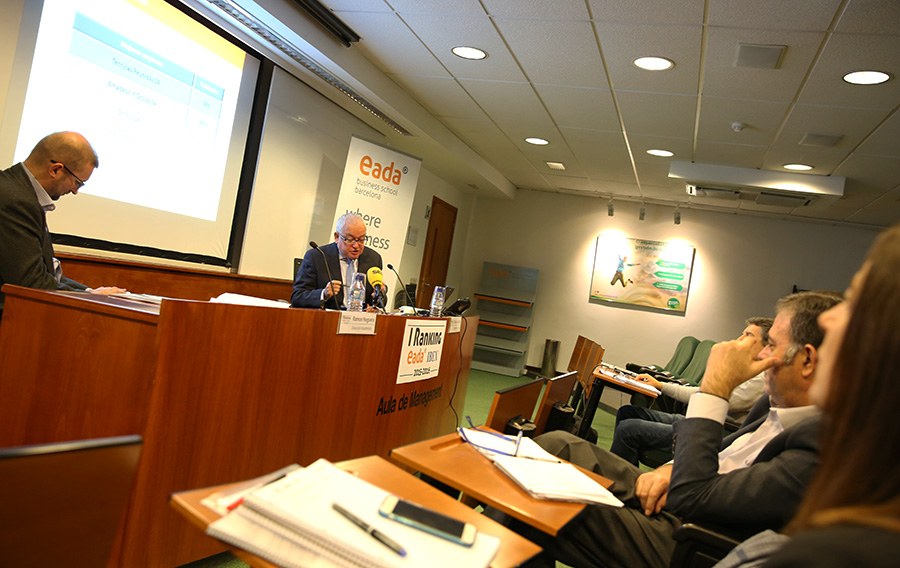The I Ranking EADA IBEX 2015-16 confirms the healthy position of Spanish companies
Radiography of non-financial IBEX businesses

After several months of research, EADA's Finance professor, Rafael Sambola, has submitted an innovative study on the economic and financial position of publicly-traded companies. This is the I Ranking EADA IBEX 2015-2016, the main differentiating factor of which is that it analyses the health of these businesses based on their main economic and financial ratios, moving away from stock market evolution-based analysis. For this, Sambola compared the accounts of 26 non-financial IBEX businesses based on 24 indicators that study five basic aspects: economic profitability, financial profitability, financial structure, investment and liquidity.
Positions in the ranking
In line with these criteria, the best ranked companies in the I Ranking EADA IBEX 2015-16 are, in this order: Amadeus, Inditex and Mediaset. The first business stands out due to the diversification of its revenue and the high value generated for shareholders. Inditex has high economic profitability and low debt levels. Mediaset has considerably improved its profitability compared to 2014, and has low net debt in relation to EBITDA –earnings before interests, taxes, depreciation and amortisation–. According to Sambola, “the common denominator for these three businesses is their high profitability –above double digits–, their low debt levels –which means less risks for investors– and the fact they invest a lot of their revenue, a key factor in ensuring economic solvency in upcoming years”.
The top ten positions in the I Ranking EADA IBEX 2015-16 are completed by Viscofán, Gamesa, IAG, Técnicas Reunidas, Grífols, Aena and Red Eléctrica de España (REE). The bottom of the table features Repsol, Arcelor and Indra, companies affected by falling profitability, stiff sectorial competition and high debt levels regarding EBITDA. However, Sambola adds, “this does not mean that the businesses lower down in the ranking are less solvent, because all Ibex companies are solvent.” He also adds, “we should highlight the strong efforts made by many of them, which is also the case for Telefónica, to invest in assets that create medium-term value.”
General conclusions
The first main conclusion we can draw from the report is the significant improvement in the businesses’ results in 2015, given that 73% have improved turnover, with 38% posting gains above 10%. Celinex is the company to have grown the most in this sense, with an increased turnover of 39.6%, followed by Técnicas Reunidas and Gamesa.
Furthermore, 65% of companies invest more than 80% of what they amortise. “This is good news, because a country that doesn’t invest gets poorer,” the EADA lecturer says. In his opinion, “businesses that are strong investors have a better growth outlook and, conversely, those that don’t invest, don’t grow.”
Another important factor is that most of the companies analysed have internationalisation percentages between 70% and 80%. Those with the most diverse foreign-looking revenues are Técnicas Reunidas (98%), Amadeus (96%) and Grífols (95%). According to Sambola, “these are particularly significant figures in terms of lowering operational and financial risks.”
However, the I Ranking EADA IBEX 2015-16 warns that 69% of companies have seen economic profitability decrease despite turnover going up. The explanation can be found in the fact that the main option businesses currently have for being competitive is lowering margins. This would explain the strong rankings of Inditex, Indra and Dia, which sell their products with small margins but in large volumes – more product rotation–. On the other hand, Enagás, Red Eléctrica and Aena operate with larger margins and more reduced volumes. As Sambola notes, “it would also be the case for luxury brands, which sell less but with higher margins.” Interestingly, he adds, “all the businesses that base their strategy on margin are the ones that have more barriers to entering the market and are also the ones that generate the most cash.”
In addition to this negative aspect, another related to results for the first half of 2016 must be added: the slowdown in turnover for most companies. Specifically, only 10 out of 26 companies have increased revenue compared to the same period in 2015. Based on this finding, Sambola reiterates the need to reinvest profits and to internationalise.
